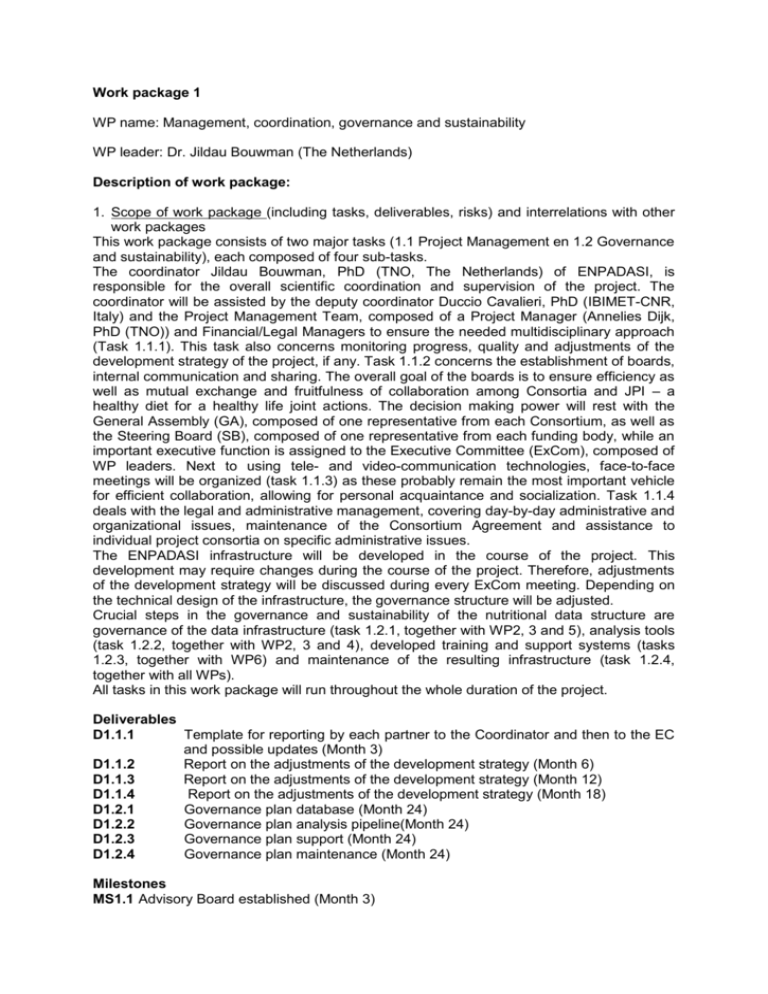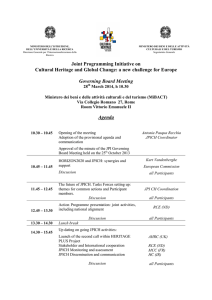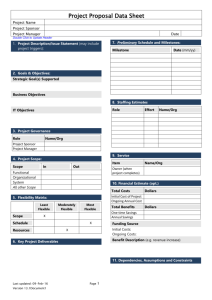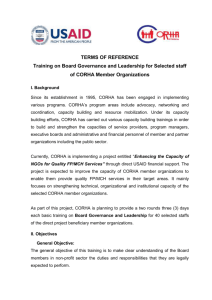Work package 1 WP name: Management, coordination, governance
advertisement

Work package 1 WP name: Management, coordination, governance and sustainability WP leader: Dr. Jildau Bouwman (The Netherlands) Description of work package: 1. Scope of work package (including tasks, deliverables, risks) and interrelations with other work packages This work package consists of two major tasks (1.1 Project Management en 1.2 Governance and sustainability), each composed of four sub-tasks. The coordinator Jildau Bouwman, PhD (TNO, The Netherlands) of ENPADASI, is responsible for the overall scientific coordination and supervision of the project. The coordinator will be assisted by the deputy coordinator Duccio Cavalieri, PhD (IBIMET-CNR, Italy) and the Project Management Team, composed of a Project Manager (Annelies Dijk, PhD (TNO)) and Financial/Legal Managers to ensure the needed multidisciplinary approach (Task 1.1.1). This task also concerns monitoring progress, quality and adjustments of the development strategy of the project, if any. Task 1.1.2 concerns the establishment of boards, internal communication and sharing. The overall goal of the boards is to ensure efficiency as well as mutual exchange and fruitfulness of collaboration among Consortia and JPI – a healthy diet for a healthy life joint actions. The decision making power will rest with the General Assembly (GA), composed of one representative from each Consortium, as well as the Steering Board (SB), composed of one representative from each funding body, while an important executive function is assigned to the Executive Committee (ExCom), composed of WP leaders. Next to using tele- and video-communication technologies, face-to-face meetings will be organized (task 1.1.3) as these probably remain the most important vehicle for efficient collaboration, allowing for personal acquaintance and socialization. Task 1.1.4 deals with the legal and administrative management, covering day-by-day administrative and organizational issues, maintenance of the Consortium Agreement and assistance to individual project consortia on specific administrative issues. The ENPADASI infrastructure will be developed in the course of the project. This development may require changes during the course of the project. Therefore, adjustments of the development strategy will be discussed during every ExCom meeting. Depending on the technical design of the infrastructure, the governance structure will be adjusted. Crucial steps in the governance and sustainability of the nutritional data structure are governance of the data infrastructure (task 1.2.1, together with WP2, 3 and 5), analysis tools (task 1.2.2, together with WP2, 3 and 4), developed training and support systems (tasks 1.2.3, together with WP6) and maintenance of the resulting infrastructure (task 1.2.4, together with all WPs). All tasks in this work package will run throughout the whole duration of the project. Deliverables D1.1.1 Template for reporting by each partner to the Coordinator and then to the EC and possible updates (Month 3) D1.1.2 Report on the adjustments of the development strategy (Month 6) D1.1.3 Report on the adjustments of the development strategy (Month 12) D1.1.4 Report on the adjustments of the development strategy (Month 18) D1.2.1 Governance plan database (Month 24) D1.2.2 Governance plan analysis pipeline(Month 24) D1.2.3 Governance plan support (Month 24) D1.2.4 Governance plan maintenance (Month 24) Milestones MS1.1 Advisory Board established (Month 3) MS1.2 MS1.3 MS1.4 MS1.5 MS1.6 Knowledge Management Committee established (Month 3) First Plenary Group meeting (Month 3) ExCom meetings (every 6 months) Second Plenary Group meeting (Month 12) Finalization meeting (Plenary Group) (Month 24) Risks 1. Liaising with all partners within the contributing consortia. 2. Liaising with all relevant other initiatives (including JPI DEDIPAC, JPI BioNH, ELIXIR, ECRIN, JPI task force around IP and open access, etc.) 2. Concept and objectives a. Objectives, vision including scientific/ technological challenges The overall objective of the Coordination, Management, Governance and Sustainability WP is that of ensuring the smooth realization and sustainability of ENPADASI, optimizing the organization and timing of activities and resources, so that both scientific and strategic project goals can be fully attained. The following specific objectives will permit to address WP 1 overall challenges: - To coordinate and supervise activities to be carried out, according to the work plan; - To coordinate and supervise activities to be carried out in the governance and sustainability of the nutritional data structure; - To monitor quality and timing of project results; - To facilitate the communication and exchange among beneficiaries, and manage conflicts that may arise, if any; - To establish and run efficiently the project managing boards; - To carry out the overall legal and administrative management of the project, in close contact and coordination with the responsible officers of the European Commission; - To manage the foreground generated within the project, as well as the access by beneficiaries to individual background; - To manage and implement the Grant Agreement and the Consortium Agreement and to proceed with amendments when and where necessary. b. State of the art Not applicable c. Scientific/ technological concept Not applicable 3. Management This WP is responsible for the management of the whole project. Appropriate meetings are described in the tasks of this WP. The task leaders of the sustainability tasks will have regular teleconference meetings with partners in the tasks and relevant tasks of other WPs. 4. Potential impact on the advancement of the research area, capacity building, plan for translation of research (suitable for ENPADASI) into public health practice or policy (in 2 years, with a perspective on a longer term) The success of ENPADASI depends on collaboration within the project, timing and usability of the infrastructure also after finalization of the project. This WP will deliver a plan for consolidation of the work done and will consider other partners and projects for sustainability issues. Translation of research in health practice or policy will be considered in the sustainability plan. In the future, the infrastructure may be expanded to other European countries and could be considered as the data sharing infrastructure in related fields. 5. Overall strategy of the work plan The main coordination, management, governance and sustainability tasks include: Task 1.1 Project management Task 1.1.1 Overall Coordination – EoI50 [lead], EoI45 [deputy], all The coordinator will supervise the execution of the ENPADASI activities and all periodical and final reports obligations. For these tasks, the coordinator will work closely with the Project Management Team and the Executive Committee. The coordinator will request concise six-monthly progress reports detailing progress of each Consortium. These reports will be organised through simple tabulated templates for ease of completion and monitoring. The collected reports will be distributed to the ExCom for consideration prior to each ExCom meeting so that particular highlights, issues and priorities can be timely identified and tackled/discussed during the meeting. The provision of such reports will not only help to optimize the meeting outcomes, but they will also provide a tool for recording progress in relation to deliverables/milestones. The ExCom will be in charge of the quality control of deliverables prior to their submission. The ENPADASI infrastructure development may require changes during the course of the project. Therefore, adjustments of the development strategy will be discussed during every ExCom meeting. The development of pan-European data infrastructure may become frustrated by administrative formalities such as data-ownership and authorship issues, and (non) partnership in ENPADASI; this will be mitigated by the appropriate parts of the consortium agreement and an inclusive collaborative approach regarding (currently) non ENPADASI partners. Risk Management: A risk review will be a permanent item on the agenda of each teleconference/meeting of the ExCom, and emerging risks will be identified and added to the risk register. The register will be used to mitigate the risks and elicit solutions. The periodic risk review process will upgrade or downgrade the risks and consider any new developments for mitigating the risks. Several of the deliverables depend on each other, especially the deliverables on the database development. Thereby, delayed delivery of work by one of the partners will affect the progress of the whole project. Delayed delivery will be a permanent item on the agenda of each teleconference/meeting of the ExCom, and emerging risks will be identified and if needed communicated with the funder of the specific partner. Related deliverables and milestones: D1.1.1, D1.1.2, D1.1.3, D1.1.4 Task 1.1.2 Project boards, internal communication and sharing – EoI50 [lead], EoI45 [deputy], all The boards (advisory board and knowledge management committee) will be formally established in the kick-off meeting. The overall goal of the boards is to ensure efficiency as well as mutual exchange and fruitfulness of collaboration among Consortia (Fig. 2), research infrastructures and JPI – a healthy diet for a healthy life joint actions. The operation of the boards will be monitored along the project duration in order to verify whether it is possible to further improve operatively and optimize the processes. We will at least invite representatives from EuroDISH, ELIXIR, JPI BioNH, JPI DEDIPAC, regulators and policy makers in the advisory board. For communication all tele- and video-communication technologies will be used, including email, tel., etc., including the implementation of a reserved area of the ENPADASI website to be used for filing project documents, for exchange of confidential information and material, for keeping updated contact details of all project participants. Furthermore, regular face-toface meetings will be organized (see task 1.1.3), as these probably remain the most important vehicle for efficient collaboration, allowing for personal acquaintance and socialization. Related deliverables and milestones: MS1.1, MS1.2 Figure 2 External relations of the ENPADASI project. Task 1.1.3 Organisation of kick-off and periodical meetings – EoI50 [lead], EoI45 [deputy], all The coordinator, assisted by the Project Management Team, will organize and implement periodical ExCom meetings (at least biannually) and annual Plenary Group meetings. All meetings shall be followed up with minutes. The first of these meetings (kick-off meeting) will be held at an early stage of the project (possibly at Month 1) to familiarize all Consortia with the structure and operation of the Knowledge Hub. The Plenary Group meetings and the ExCom meetings will regularly bring members of ENPADASI together, will play a pivotal role in coordinating activities across teams and WPs, and will provide guidance on appropriate integration of team effort. Additionally, they will provide opportunities to resolve any issues impeding progress and to develop appropriate contingency plan. Related deliverables and milestones: MS1.3, MS 1.4, MS1.5, MS1.6 Task 1.1.4 Legal, administrative management – EoI50 [lead], EoI45 [deputy], all The legal, administrative management will cover (1) day-by-day administrative and organizational issues (including meeting organization and follow-up); (2) maintenance of the Consortium Agreement; (3) assistance to individual project consortia on specific administrative issues. Each partner will be responsible for their own reporting to their funders but the work input from each partner will be made visible as a reference for all reporting activities. Management activities will be organized by the coordinator and carried out with the assistance of the Project Management Team and with the contribution of all consortia within ENPADASI. Close contact will be kept with the responsible officers at the call secretariat in order to ensure that all activities carried out are compliant with the JPI rules. Any need for amendment will be timely dealt with in collaboration with the call secretariat. Task 1.2: Governance and sustainability of the ENPADASI infrastructure Task 1.2.1: Database governance – EoI50 [lead], together with WP2, 3 and 5 Part of the work done in ENPADASI will result in a (federated) database for nutritional studies. This database will be developed in WP3. This task concerns development of a governance plan focusing on how to make the database available to all partners and other (European) nutritional groups. Essential questions that should be answered in this plan are: Which data should be stored centrally (link with WP2 and WP5)? Who should have access to the data (link with WP5, JPI DEDIPAC and JPI BioNH)? What is the growth potential of the data that will be stored centrally? What system type is necessary (grid/cloud/cluster)? Which other consortia have arrangements for data storage (e.g. link with ELIXIR)? What are the yearly costs related to the storage? How long should the storage be secured? What service level for the storage is needed? Which funding is available for long term storage (see also task 2.4)? Which organization should take care of the maintenance (e.g. link with ELIXIR)? This plan should at least describe a solution to keep the system up-and-running for 5 years after the finalization of the project and should consider the federated nature of some of the datasets in the project. Related deliverables and milestones: D1.2.1 Task 1.2.2: Analysis governance – EoI50 [lead], together with WP2, 3 and 4 Part of the work done in ENPADASI will result in an analysis pipeline for nutritional studies. This pipeline will be developed in WP4, part of which will be integrated in the ENPADASI infrastructure of WP3. This task concerns development of a governance plan focusing on how to make the analysis tools available to all partners and other (European) nutritional groups. Essential questions that should be answered in this plan are: Which analysis tool should be made available to the community (link with JPI DEPIPAC and JPI BioNH)? What calculation power is needed for these analysis tools? What system type is necessary (grid/cloud/cluster)? Which other consortia have arrangements for central use of calculation power (e.g. link with ELIXIR or a nutritional ESFRI (EraNet call))? What are the yearly costs related to the analysis pipelines? How long should the analysis pipelines be accessible? What service level for the analysis tools is needed? Which funding is available for long term availability (see also task 2.4)? Which organization should take care of the maintenance (e.g. link with ELIXIR or a nutritional ESFRI)? Related deliverables and milestones: D1.2.2 Task 1.2.3: Governance training and support – EoI50 [lead], together with WP6 The support and trainings developed within WP6 should be continued after finalization of the ENPADASI project (e.g. training of JPI BioNH users). Other consortia may have arrangements for support and training in the area of bioinformatics and/or nutrition (e.g. link with ELIXIR or a nutritional ESFRI (EraNet call)). In coherence with these consortia, this task should deliver a plan for sustained training in the ENPADASI infrastructure. Related deliverables and milestones: D1.2.3 Task 1.2.4: Maintenance – EoI50 [lead], together with all WPs Updates on e.g. operation systems and security systems, but also resolution of bugs are essential to keep the ENPADASI infrastructure up and running after finalization of the project. Therefore, this task should deliver a plan how to fund and organize the maintenance of the ENPADASI infrastructure. During the cause of the ENPADASI project the central database for intervention studies will be maintained by TNO. Partners that do not want to store their data in the central instance of the Phenotype database can install a local version on their own servers and maintain the system themselves. For observational studies databases are generally already developed and maintained by the partners. Related deliverables and milestones: D1.2.4






